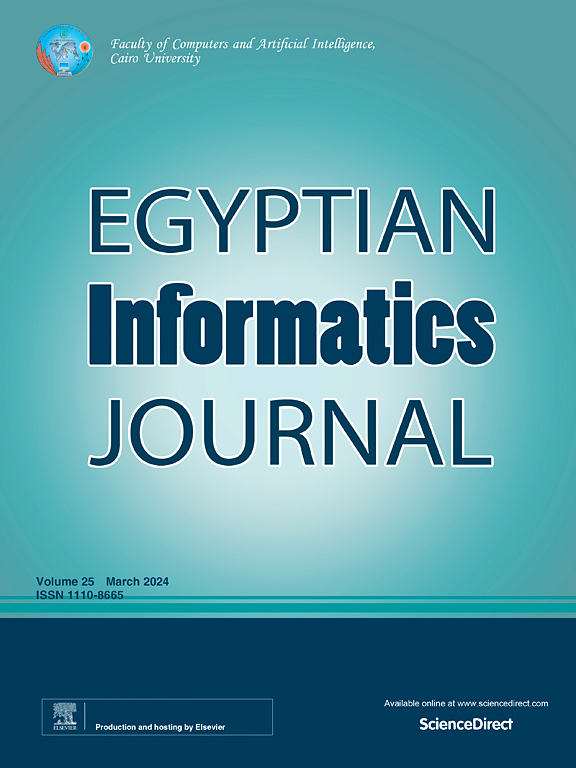A hybrid deep learning-based model for enhanced feature representation in image retrieval systems
IF 4.3
3区 计算机科学
Q1 COMPUTER SCIENCE, ARTIFICIAL INTELLIGENCE
引用次数: 0
Abstract
The exponential growth of image data volume has made the necessity of accurate and efficient retrieval systems more and more evident; in this regard, extracting comprehensive and meaningful features and their optimal selection has become a vital issue in image processing and machine learning research. The present study, with the aim of improving the representation of features in image retrieval systems, presents a novel hybrid model based on deep learning. In the proposed method, first, a rich set of image features is created by combining contextual features (Local Binary Pattern (LBP) and Histogram of Oriented Gradients (HOG) on image fragments), basic features (statistical features and Gray Level Cooccurrence Matrix (GLCM)), and deep features (extracted through a convolutional neural network). Then, in order to reduce the dimensions and select the most expressive features, a new feature selection algorithm based on reinforcement learning using learning automata is applied. Finally, the Fuzzy C-Means (FCM) clustering model is used to build a retrieval model and recall related images based on the selected features. The originality of this research lies in providing an integrated model that, by making intelligent integration of various methods of feature extraction and a reinforcement learning-based feature selection algorithm, attempts to break the bottleneck of current models in terms of diversity of image feature description and precision of retrieval. Evaluation of the proposed method on two datasets, Corel-1000 and ALOI, showed that this method provides significant performance compared to other methods, achieving average Precisions of 0.9711 and 0.8906 in these datasets, respectively. This indicates the efficiency of the proposed approach in extracting and selecting relevant and effective features for accurate image retrieval.
图像检索系统中增强特征表示的混合深度学习模型
图像数据量的指数级增长使得准确、高效的检索系统的必要性越来越明显;因此,提取全面而有意义的特征并对其进行优化选择已成为图像处理和机器学习研究中的一个重要问题。为了改善图像检索系统中特征的表示,本文提出了一种基于深度学习的混合模型。该方法首先通过结合上下文特征(图像片段上的局部二值模式(LBP)和定向梯度直方图(HOG))、基本特征(统计特征和灰度共生矩阵(GLCM))和深度特征(通过卷积神经网络提取)创建丰富的图像特征集。在此基础上,提出了一种基于学习自动机的强化学习特征选择算法,以降低特征维数并选择最具表现力的特征。最后,利用模糊c均值(FCM)聚类模型建立检索模型,根据选取的特征召回相关图像。本研究的创新之处在于提供了一个集成模型,通过对各种特征提取方法的智能集成和基于强化学习的特征选择算法,试图打破现有模型在图像特征描述多样性和检索精度方面的瓶颈。在Corel-1000和ALOI两个数据集上的评价表明,与其他方法相比,该方法具有显著的性能,在这两个数据集上的平均精度分别为0.9711和0.8906。这表明该方法在提取和选择相关有效的特征以实现准确的图像检索方面是有效的。
本文章由计算机程序翻译,如有差异,请以英文原文为准。
求助全文
约1分钟内获得全文
求助全文
来源期刊

Egyptian Informatics Journal
Decision Sciences-Management Science and Operations Research
CiteScore
11.10
自引率
1.90%
发文量
59
审稿时长
110 days
期刊介绍:
The Egyptian Informatics Journal is published by the Faculty of Computers and Artificial Intelligence, Cairo University. This Journal provides a forum for the state-of-the-art research and development in the fields of computing, including computer sciences, information technologies, information systems, operations research and decision support. Innovative and not-previously-published work in subjects covered by the Journal is encouraged to be submitted, whether from academic, research or commercial sources.
 求助内容:
求助内容: 应助结果提醒方式:
应助结果提醒方式:


